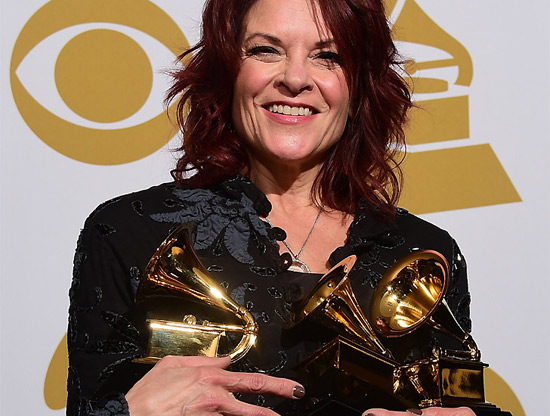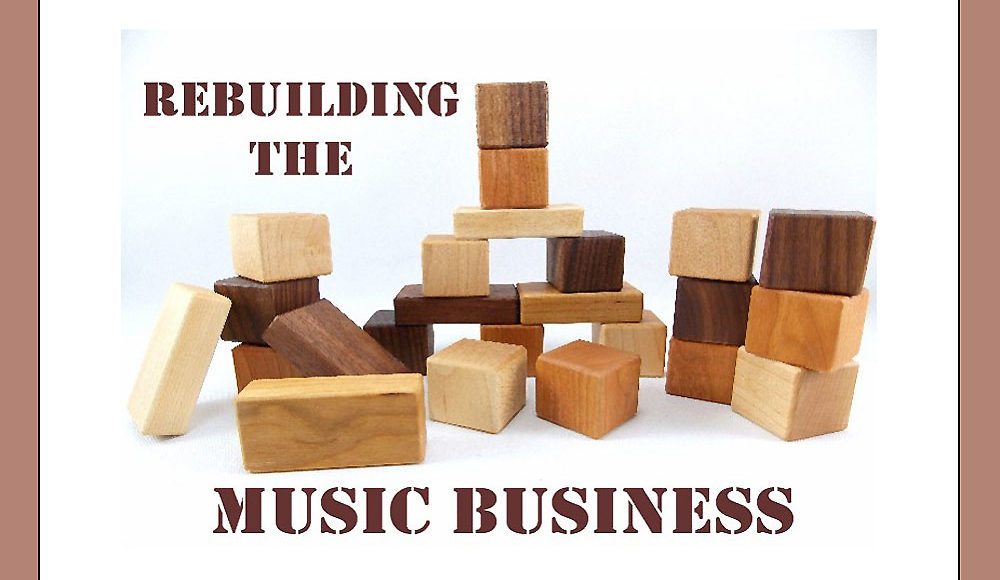Admittedly, I’m not a music streaming customer. While I channel some (but not most) of my entertainment through my computer, I actually prefer watching television on a television, and listening to music via CDs or my iPod. Music streaming had not been on my radar at all until last year.
Last spring I became aware of the problem of the ridiculously low compensation artists and songwriters were receiving from the streaming music services when Rosanne Cash revealed she had received a royalty payment of $114.00 for over 600,000 streams. Not possible, I thought – and then I started seeing more and more horror stories of a similar nature.
 Rosanne Cash celebrated a career highlight with three Grammy wins in February, 2015.
Rosanne Cash celebrated a career highlight with three Grammy wins in February, 2015.
Aloe Blacc’s was the story that made my eyes pop: in an editorial in Wired magazine, he recounted that the phenomenally successful “Wake Me Up!” which he co-wrote and sang, yielded $12,359 in publishing royalties from Pandora, where it had set records with more than 168 million streams. That twelve thousand plus, split with two other co-writers, yielded him $4100 for his share of the biggest year of a huge hit. That kind of return is nothing to base a career on.
The fact is the landscape of the music business I grew up with and worked in – and which worked for most participants – has shifted so dramatically in less than twenty years that the long-term health of the music business and livelihood of artists, songwriters, and musicians is threatened.
For decades that landscape looked like this: record companies supplied music to radio stations free in exchange for promotional airplay. That airplay, in fact, both promoted sales of both albums and singles (which took place for the most part in record stores) and generated performance royalties as well. Artists and songwriters received royalties (including royalties on album cuts and B sides), and their record sales promoted their appearances at local venues around the country, So there were many interdependent links in this interactive infrastructure: record companies, radio stations, artists, songwriters, retail stores, music clubs – and the consumer of course.
That model was based on both a retail economy and what we now call “terrestrial” radio, one of the many, many things changed by the Telecommunications Act of 1996. The resulting homogenization of the radio industry (Clear Channel anyone?) sapped much of the vitality out of music radio over the next ten years, downloading entered the scene, and then we all got double-whammied with the crash of 2008 and the world changed. Overnight, it seemed, brick and mortar stores became artifacts of an earlier age.
Technology stepped into the void, as it has so many times in the last twenty years, and now we have streaming services. Suddenly downloading music is so five years ago. But now, since you can listen to whatever you want whenever you want for a ridiculously low subscription fee per month, ‘Internet radio’ doesn’t promote sales, it replaces sales. Yet they are using some bastardized version of formulas developed for terrestrial radio in a different world and different time to pay ridiculously low rates to compensate the artists who create the music.
 With his “Wired” article and a noted appearance on “Real Time with Bill Maher,” Aloe Blacc has been one of the most vocal critics of streaming services.
With his “Wired” article and a noted appearance on “Real Time with Bill Maher,” Aloe Blacc has been one of the most vocal critics of streaming services.
If Aloe Blacc is making $4000 for his share of a wildly popular song, what does the mildly successful artist with a regional following have to look forward to? According to Martin Bandier, CEO of Sony/ATV, a million plays on Pandora will yield $60 in songwriter royalties. If I were a songwriter, I would think people wanting to hearing my song enough to generate a million plays would mean some level of success. Wow, a million plays! But if those million plays generate sixty dollars? Whoa! $60 bucks? How long will musicians and songwriters be able to keep going when there is no payoff at the end of the yellow brick road?
The Pandora and Spotify models make me think of those all-you-can-eat buffets. What if all the restaurants in your town suddenly changed to that format? Sure, for several weeks or a few months, what a treat: Italian, French, Thai, Chinese, whatever you want, all yours for $9.99!
But what do you think that would happen to your dining-out choices in the long term? Would the owners of those restaurants start cutting back and limiting the choices? Do you think creative chefs would be clamoring for jobs in these establishments? Isn’t it more likely that everything would start tasting the same after a while?
Imagine what that same thinking will do to the music business.
Next, how the music business is falling victim to the 1% pattern.





Paul Brown | March 28, 2023
|
Hi, all is going nicely here and ofcourse every one is sharing data, that’s actually excellent, keep up writing.